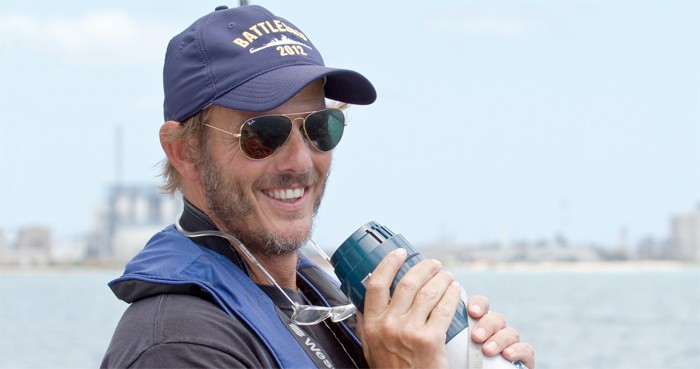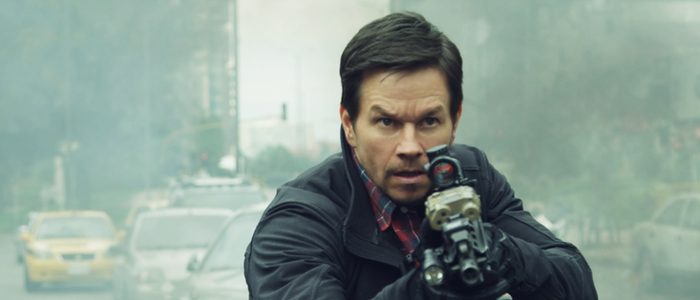‘Mile 22’ Director Peter Berg On Not Wasting Time With Mark Wahlberg [Interview]

Director Peter Berg is not one for wasting time. He says as much, but it’s also evident when you’re on the set of one of his movies, speaking with an actor he’s worked with, or talking to the man himself. Look no further than his filmography the last few years to see the borderline light-speed pace at which he works. He’s made four movies in the last two years, including his latest pic, Mile 22. Nobody could ever call Peter Berg lazy, that’s for certain.
His newest and fourth collaboration with Mark Wahlberg is a significantly lighter film than their past work. It’s Berg, who made a remarkable directorial debut with The Rundown, returning to straight-up action movies. The Kingdom director brings his eye for fast-paced, practical, and point-of-view-driven action to his new lean and mean action movie. Recently, Berg told us about filming Mile 22‘s action, his respect for Wahlberg’s work ethic, when we’ll see his Rihanna documentary, and more.
Mile 22 was originally talked about as being a martial arts film, so how did the project evolve over the years?
I always wanted to make a movie with Iko [Uwais]. I mean, it really was that simple. I was a huge fan of his. I think the guy is very unique, very special and I just wanted to work with him. And then Mark got involved and it got a little bit bigger. At the core it was always just – the evolution was pretty constant, it was my desire to work with Iko and that just evolved into me working with Iko.
You gave him complete freedom choreographing those fight scenes, right?
Oh, a hundred percent, I completely defer to him and his crew. I’m there, I offer opinions, I offer ideas, but at the end of the day whatever Iko wants to do, we’re gonna do. I look forward to doing more with him. If I have any regrets, it’s that I don’t have more Iko fighting in the movie.
How did he end up being handcuffed through a lot of the movie?
Well, that actually was an idea I think that came from me to handcuff him, because I wanted to put obstacles in front of him. I think my only suggestion [was] ‘do whatever you want, but you gotta be handcuffed for a big chunk of it.’ The rest of it was Iko and his guys just doing what they do, which I think is an art form. And I think one of the things that’s a bit unsettling and also very unique, is that Iko really does 100% of all of his stuff. There’s no stunt doubles, there’s no backup. So sometimes I’m holding my breath, just praying he doesn’t get hurt because it would be catastrophic to the movie.
How many cameras do you usually shoot action with?
Usually three.
The action is very fast. How tough is it getting that speed and rhythm right in post?
It’s a process with Iko because he’s really doing it. You can usually cut less than you might have to be if you had stunt doubles but – it’s a definite process dialing in these fights editorially, but because Iko’s doing all of it, it’s much easier. There’s a lot of work. I’ve got a great editor, Colby Parker Jr., but cutting action takes time and to dial it in is always a process.
You usually get pretty close to the action. What is it about visualizing action that way that appeals to you, getting that close and intimate?
I want the action to be more of a participatory experience for the audience. I don’t want them to just sit back and watch it, I want them to feel kind of in it, immersed in it, surrounded by it, unsettled by it. There’s a bunch of different techniques for doing that, but I can’t tell you could steal all my secrets.
I think it’s important to define the character of any action sequence, the psychology of it. Whether it’s a football game, a gun fight, or a street fight, an emotional argument between two lovers. Action sequences for me are as good as your ability to connect emotionally with the audience. I always try to find some emotional connection point between the action and the audience. So I’m thinking about emotion and the character of the sequence.
I visited the set a few months ago, and it was obvious how fast everyone was moving through the day. How many takes do you usually do on a day?
I don’t normally work with takes because I tend not to cut, I just go again and concentrate on stunt work or things like that, where I have to reset I generally – anyone who knows me knows that I like to work fast and intensely, so once we get set up, we tend to work very quickly. Our days are shorter than most movie sets, I think.

What do you like about working at that speed? Do you just enjoy going off instincts and leaving no time for second-guessing?
Yeah, I think that it’s kind of my responsibility to know what I want and to get that. I’ve experienced collective committee interpretation of directing scenes, or you know, you start second-guessing. Once you start to get on that road, it can be a tricky road, a slippery slope. So, I’m able to make adjustments, or change my mind or listen to suggestions, but I generally try to know what I want and get that and move on.
How does that approach work when you’re shooting a hundred and fifty million dollar movie? Is the process any different at that level?
Not really. I mean, it doesn’t really matter what the budget is to me. It’s all about the moment and about the scene. I could be directing a scene in a documentary, or a commercial, or a TV show, or a lower budget film, or something like what you just spoke of – it’s all pretty much the same process for me, I just take it one moment at a time and focus on that.
One thing you and Mark Wahlberg seem to really connect over is work ethic. Would you say that’s accurate?
That’s a big reason that Mark and I get along so well is that all of things that we’re talking about, Mark would probably have a similar opinion on. We don’t like to waste time, we’ll work really hard, and Mark wants people around him that know what they’re doing and have clear vision, and are able to execute that. I want the same thing, so Mark and I tend to work at a very similar pace and we both have very similar philosophies about this.
I interviewed him recently, and he seems like an actor who’s very focused on the bigger picture.
I think so. It’s like he’s focused on the moment, but also the sequence the moment is going to be a part of and then the overall movie the sequence is going to be a part of. And then he’s also focused on the legacy of his career. It’s like we, I think, are very forward thinking, both of us, so we’re in the moment but we’re also expecting each other to think about the big picture of the movie and often times what’s next and that’s why we end up working together so much.
He thinks about the legacy of his career, but how about yourself? You strike a good balance between art and commerce like he does, but how much do you think about the commercial side?
I’m cognizant of the investment, the business component of this job. At the end of the day if anybody really knew how to consistently make hit movies, that would be a very, very, very, very wealthy human being. Nobody knows for sure and obviously if you’ve got Iron Man or Spider-Man in the movie, it’s – I think the risk can be marginalized and reduced, but at the end of the day, you’ve got to follow your instincts and follow your own taste and sensibilities and stay true to that. And I find that if I do that, more times than not the financial outcome is good. It’s not always smash great good, but if it’s good then I feel good and then I sleep well at night.
You’re clearly confident in your instincts, but have you ever had an experience on a film where maybe you didn’t trust your instincts?
Yeah, I’ve made a lot of mistakes but I can look back on some of those, and decisions I’ve made where I probably wouldn’t make again, but I think that’s – I look at that as just life. I’ve never been paralyzed with indecision in anything. I don’t ever need real strong regret and I do look back and think about the decisions I’ve made, both personally and professionally and the things I’ve done that I would do again and the lessons that I’ve learned that I probably wouldn’t repeat. I just think that’s just a natural evolution and that’s part of growing and living. I’ve never been paralyzed in the moment.
The last few movies you’ve made with Mark Wahlberg, do you think they’ve changed you at all as a filmmaker?
I really don’t think about my life and my career with that kind of clarity. Maybe I should. I generally just follow my instincts and where I’m at creatively at any given moment is kind of where I’m at. Those films are all very different movies. Obviously, Mark was in them, they were nonfiction, there was a tragic component, so you could make those comparisons. But for me, those are just radically different experiences and making of the movies was so different, the stories were so different, the challenges they presented me with were so different that I just look at them sort of singularly and – I don’t look at them as a trilogy but as creatively satisfying experiences.
Just how important those stories were and the quick succession they were made in, I thought there’d be some influence, but that makes sense. After shooting and cutting together so many of Wahlberg’s performances, though, what strengths do you know that he has you want him to bring to a character like Jimmy Silva?
He will literally do anything asked of him. If you want vulnerability, if you want silliness, if you want heartbreak, if you want him to tap into confusion – anything, he’ll do it and he really loves it. And I was surprised. The more I work with Mark, the deeper I get to know him, the more aware I am of how he is an actor who really wants to be pushed and if you push him, he’ll go there and I respect that so much.
I’m excited about your next movie, the Rihanna documentary.
Yeah, me too.
But we haven’t heard too much about it. When might we see it? What’s it about?
I think she’s an extraordinary young woman and it really is kind of a pretty comprehensive profile of what goes in to making her this talent that she is. The work ethic, the talent, luck, the hustle, the vision. She’s a really, really interesting woman and the movie will be out in about a month and half, two months we’ll be able to start showing it.
***
Mile 22 is in theaters now.
The post ‘Mile 22’ Director Peter Berg On Not Wasting Time With Mark Wahlberg [Interview] appeared first on /Film.
from /Film https://ift.tt/2MTwZDm
![‘Mile 22’ Director Peter Berg On Not Wasting Time With Mark Wahlberg [Interview]](https://i.ytimg.com/vi/eJU6S5KOsNI/default.jpg)
No comments: